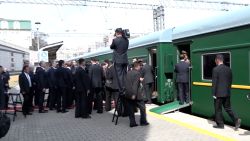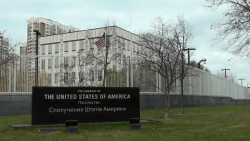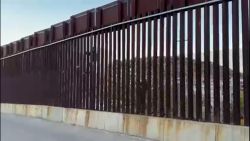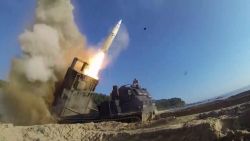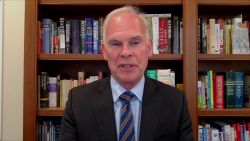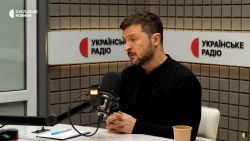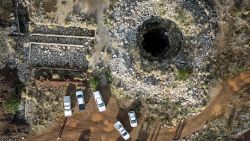Kim Jong Un’s heavily armored private train has crossed into Russia and the North Korean leader has met with officials, state media reported Tuesday, ahead of an expected and closely watched summit with Russian President Vladimir Putin that the US has warned could result in an arms deal.
Kim briefly left his train at Khasan train station in the Russian far east on Tuesday, according to Russian state media outlet TASS, where he was greeted by Russian Natural Resources minister Alexander Kozlov and the governor of the Russian region that borders his secretive state. North Korean state media confirmed the stop.
The North Korean leader is expected to travel onwards for a one-to-one with Putin elsewhere in Russia’s far east.
That meeting would be a significant development, analysts say, bringing together two leaders who are increasingly isolated on the world stage.
Russia desperately requires fresh supplies of ammunition and shells after more than 18 months of war in Ukraine has left its military battered, while North Korea, which has faced years of international sanctions over its nuclear weapons program, is short of everything from hard cash and food to missile technology.
The meeting could lead to Pyongyang getting its hands on the sort of weapons two decades’ worth of United Nations sanctions have barred it from accessing, especially for its nuclear-capable ballistic missile program.
The US government said last week that arms negotiations between Russia and North Korea are “actively advancing,” and further talks could take place as part of Russia’s efforts to find new suppliers for weapons to use in its war against Ukraine.
South Korean Defense Ministry spokesperson Jeon Ha-kyu also said Tuesday the ministry is closely monitoring whether North Korea and Russia will proceed with negotiations on an arms deal and technology transfer.
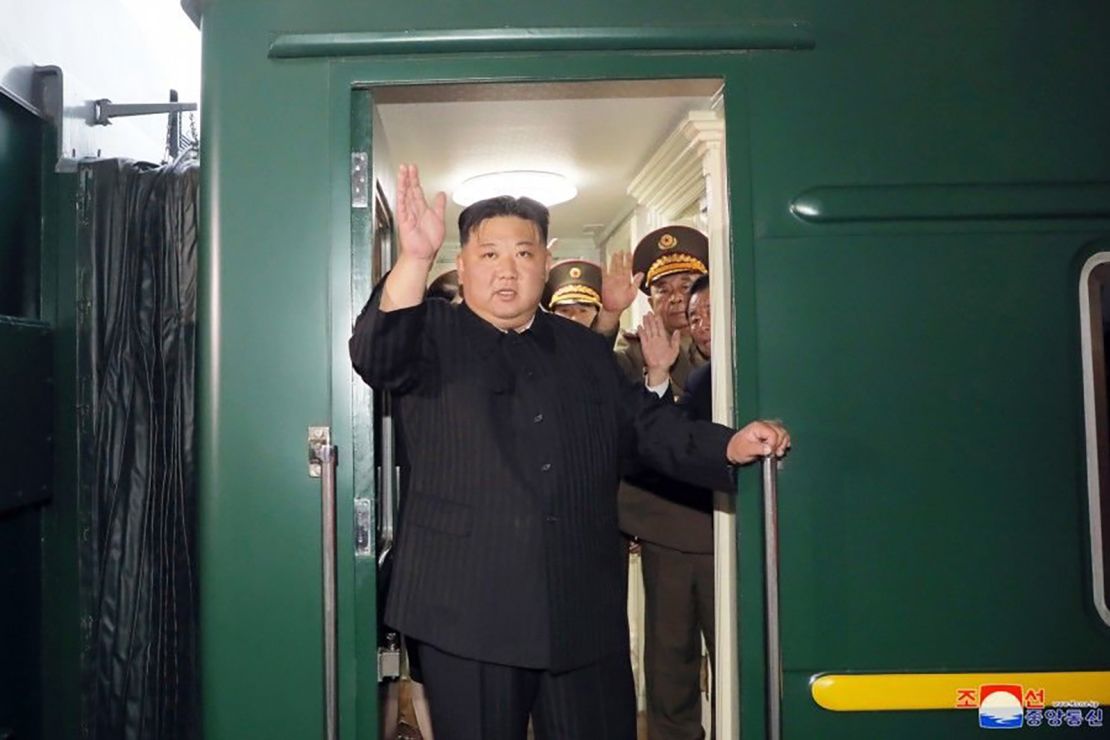
The North Korean leader departed the capital, Pyongyang, on Sunday afternoon accompanied by top party officials and members of the government and armed forces, North Korean news agency KCNA reported Tuesday.
North Korea’s top officials, including military leaders and the chief diplomat, are among Kim’s delegation, according to photos shared by North Korean state media KCNA.
In one photo released by KCNA, Kim’s second-in-command of the military, Ri Pyong Chol, was seen onboard the train. Ri is a target of US and UN sanctions for his role in leading the country’s ballistic missile programs as the former head of Department of the Munitions Industry.
Previous images released by KCNA showed Kim walking down a red carpet at a Pyongyang station and boarding the green train. A crowd of onlookers could be seen cheering in the background and waving flags.
Neither country has specified when or where the visit would take place.
“At this point we are not saying, in the Far East,” Kremlin spokesperson Dmitry Peskov told reporters according to Russian state media TASS, later adding a meeting between the two leaders would happen in “the next few days.”
Peskov said bilateral relations between the nations will be a priority of the meeting, which will be a “full-blown visit, with talks between the two delegations.”
The talks will also touch on “sensitive areas,” Peskov added, while a formal dinner is also planned in honor of Kim’s arrival.
Russia’s Far East region is a massive swath of territory that shares land borders with China, North Korea and Mongolia. According to South Korean news agency Yonhap, the train believed to be carrying Kim appears to be moving toward a more northerly destination than the eastern port of Vladivostok, toward Khabarovsk province bordering China instead, citing multiple local sources in Vladivostok.
Putin was in Vladivostok Tuesday for the Eastern Economic Forum, where he gave an address touting Russia’s trade opportunities with countries in Asia Pacific.
“Russia’s trade with other countries in the region added 18.3 percent in only six months of this year,” he said. “Trade with countries of the Asia Pacific region will be developing even further.”
Putin also met with China’s Vice Premier Zhang Guoqing on the sidelines of the forum and said relations between the two countries had reached an “unprecedented historical level,” according to Russian state media agencies.
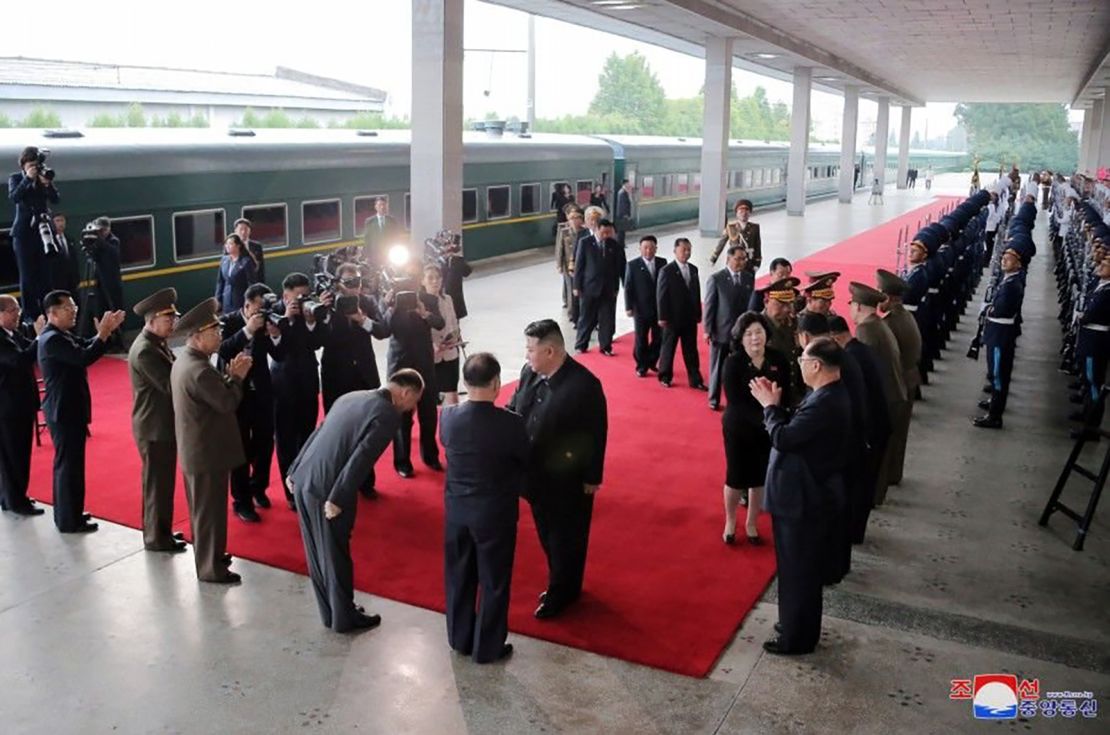
A rare trip for Kim
Kim’s arrival in Russia marks a rare foreign trip for the leader of one of the world’s most isolated nations, and it’s his first visit abroad since the Covid-19 pandemic, during which North Korea’s borders were sealed.
Since assuming power in 2011, Kim has only ventured abroad 10 times – all in 2018 and 2019 – and came as the North Korean leader engaged in a series of talks over the country’s nuclear weapons and missile programs.
Kim last visited Russia in April 2019 on a trip to Vladivostok where he met Putin for the first time amid the ongoing and unresolved crisis over North Korea’s nuclear program and failed dialogue between Pyongyang and Washington.
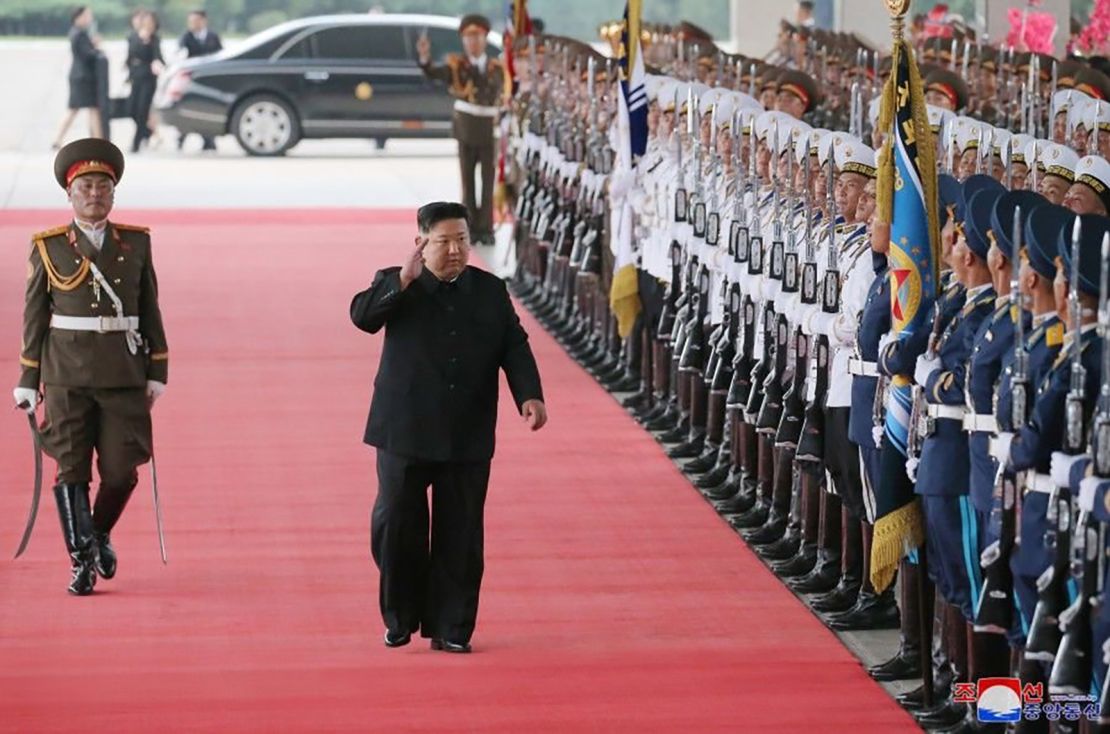
As in 2019, the North Korea leader traveled to Russia Tuesday in his famed, characteristically green train that has by now become a symbol of the hermit nation’s isolation and secrecy.
Like his grandfather, Kim Il Sung, and his father, Kim Jong Il, it is said Kim prefers traveling in the upscale armored train, which has long been the subject of intrigue.
Washington’s warning
The warning from Washington about what could be offered during a possible Kim-Putin meeting came after Russian Defense Minister Sergei Shoigu visited Pyongyang in July in an attempt to convince it to sell artillery ammunition to Moscow.
Last Tuesday, White House national security adviser Jake Sullivan warned North Korea will “pay a price” if it strikes an arms deal with Russia, though he did not elaborate on the potential repercussions.
And on Monday, the White House urged North Korea to “not provide or sell arms to Russia.”
“As we have warned publicly, arms discussions between Russia and the DPRK are expected to continue during Kim Jong Un’s trip to Russia,” said National Security Council spokesperson Adrienne Watson.
North Korea is already under United Nations and US sanctions imposed over Pyongyang’s weapons program.
Despite the UN sanctions, Kim has been developing his ballistic missile program at breakneck pace for the past two years. In that period he has tested dozens of missiles, including intercontinental ballistic ones (ICBMs) that in theory could deliver a nuclear warhead over the US mainland.

But doubts remain over the extent of the country’s capabilities.
Were Kim to get his hands on technology from Russia, a world leader in nuclear missile forces for decades, it would be a boost for his programs and a great concern for leaders in the West, analysts said.
Speaking to CNN ahead of the meeting, Leif-Eric Easley, professor of international studies at Ewha Womans University in Seoul said a one to one between Kim and Putin would be a “very significant development.”
“Russia has the military technology that Kim wants for his illegal satellite launch and nuclear weapons delivery programs,” Easley said.
Moscow, in turn, badly needs ammunition and small arms – areas where analysts say North Korea has strong production capabilities – on the front lines in Ukraine.
“North Korea makes good what I call heavy industrial weapons,” said Carl Schuster, a former director of operations at the US Pacific Command’s Joint Intelligence Center. “Its artillery and ammunition is very good. It’s very similar to Russian designs.”
However, other analysts have said North Korean ammunition would not be a game changer for Russia in Ukraine.
“These [arms] could help replenish depleted stocks and prolong the conflict but are not going to change its direction,” said Joseph Dempsey, research associate for defense and military analysis at the International Institute for Strategic Studies.
After reports emerged of North Korean arms sales to Russia in September 2022, a North Korean Defense Ministry official said at the time that Pyongyang had “never exported weapons or ammunition to Russia before and we will not plan to export them.”
CNN’s Teele Rebane, Arlette Saenz, Yoonjung Seo, Anna Chernova, Heather Law, Mihir Melwani and Mitchell McCluskey contributed to this report






